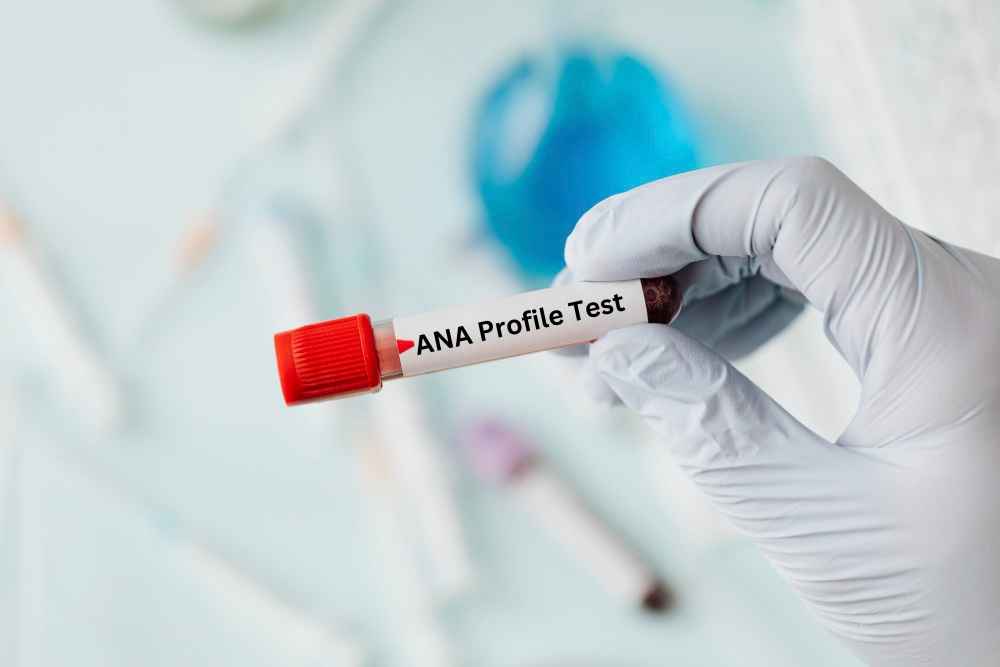ANA Profile Test List - A Comprehensive Guide

Medically Reviewed By
Dr Divya Rohra
Written By Ritish Sharma
on Jun 1, 2023
Last Edit Made By Ritish Sharma
on Sep 1, 2025

Are you scheduled for an ANA (Antinuclear Antibody) Profile Test and feeling overwhelmed? Don't worry; we're here to help!
The ANA Profile Test is a blood test that helps to diagnose autoimmune diseases, which occur when the body's immune system attacks its tissues. The ANA Profile Test List consists of tests designed to detect and measure these antibodies, providing crucial insights into possible underlying autoimmune conditions.
In this comprehensive guide, we'll walk you through everything you need to know about ANA profile tests, including what they are and how they work.
ANA Profile Test
The ANA Profile Test is a diagnostic tool used to detect the presence of antinuclear antibodies in the bloodstream. Antinuclear antibodies are a group of autoantibodies that mistakenly attack the body's cells and tissues, triggering a cascade of immune responses.
Their presence indicates an abnormal immune response, as they mistakenly recognize and attack the body's cells and tissues.
By analyzing the ANA profile, doctors can gain insights into the type and intensity of the immune response, aiding in accurately identifying and monitoring autoimmune conditions.
Symptoms that require ANA Profile Test
- Persistent fatigue
- Unexplained joint pain
- Skin rashes
- Muscle weakness
- Recurrent fevers
- Numbness
- Kidney problems
- Hair loss
- Abnormal blood clotting
ANA Profile Test List & Parameters
The ANA Profile Test List is a comprehensive panel of autoantibodies used to diagnose and monitor various autoimmune disorders. Each antibody in the list represents a specific parameter that helps identify certain autoimmune conditions.
ANA Profile test includes:
- AMA-M2 (Mitochondrial)
- CENP B
- Ds-DNA
- Histones
- JO-1
- Ku
- Mi-2
- Nucleosomes
- PCNA
- PM-Scl
- Ribosomal
- Ribosomal Protein
- Ro 52
- Scl-70
- SS-A (RO)
- SS-B (La)
- U1-nRNP/Sm
These antibodies are associated with different autoimmune diseases, and their presence or absence can provide valuable insights.
For example, AMA-M2 is linked to primary biliary cholangitis, while Ds-DNA antibodies are commonly found in systemic lupus erythematosus. Identifying specific antibodies helps diagnose accurately, distinguish between different autoimmune disorders, and determine the appropriate treatment options.
With ongoing research and advancements in the field, the ANA Profile Test List continues to evolve, offering improved diagnostic accuracy and enhancing patient care.
What is the normal range of an ANA profile test?
The ANA profile test normal range is reported as a "titer." A ratio such as 1:40, 1 80, 1:160, etc. Reference ranges can vary by lab.
Always consult an expert for a professional interpretation of test results, as they may be influenced by factors such as age, medication, or infections.
| Result Category | ANA Titer Value |
|
|
|
|
|
|
What do these levels mean for you?
The ANA test results vary from person to person. Healthcare providers always interpret results along with symptoms, physical exam, and other tests. Here is a general overview of ANA test levels:
1. Normal (Negative): No significant antinuclear antibodies detected.
How to maintain them?
There is no specific regimen to maintain normal ANA levels. However, by promoting overall immune health you can reduce the risk of triggering abnormal immune responses.
- Adopt an anti-inflammatory diet: Focus on whole foods, healthy fats, nuts, seeds, plenty of fruits and vegetables, and minimal processed items.
- Manage stress effectively: Chronic stress can be harmful for your immune system. Techniques like deep breathing, meditation, yoga, exercise, and adequate sleep can help.
- Avoid unnecessary medications: Did you know some drugs can trigger false-positive ANA test results? Always inform your doctor about all medications you are taking before an ANA test
- Maintain regular health checkups: Regular health checkups are crucial for early detection of autoimmune or inflammatory issues, especially, if you have risk factors or family history. .
- Maintain healthy lifestyle: Avoid smoking and limit alcohol to not let negatively impact your immune system. Moderate exercise such as walking, cycling, or swimming help maintain healthy immune function.
2. Borderline/ Low Titer: Low levels are sometimes present in healthy individuals. They are not always linked to disease.
Possible Symptoms/Risk
In most cases, the patient is asymptomatic; no symptoms are visible. Hence, the result may be false-positive. Sometimes, borderline/low titer ratio may appear if you have mild, early, or non-specific symptoms:
- Fatigue
- Mild joint pain
- Occasional skin rashes
- Generalized body aches
- Thyroid disorders
Note: Borderline or low titers rarely indicate a serious health condition, but if symptoms are persistent, doctors may order further tests.
3. High Titer (Positive): Suggests higher possibility of autoimmune disease, but must be explained with symptoms and clinical findings.
A high titer (≥1:160) suggests a higher chance of autoimmune disease but does not confirm it.
-
When a Positive ANA Test May Not Be Concerning
A positive ANA test may not always be concerning, since temporary elevations can occur due to factors like infections, certain medications, or even age-related changes.
-
When a Positive ANA Test May Be Concerning
If your ANA test shows a level of 1:160 or higher, and you are facing tiredness, joint pain, skin rashes, fever, or signs of organ involvement, it could mean you have an autoimmune problem.
If these symptoms don't go away, your doctor will likely suggest more tests, such as anti-dsDNA, ENA (Extractable Nuclear Antigen) panel, or rheumatoid factor to help identify the specific disease more accurately.
In short, we can say that a positive ANA test becomes a cause of concern only if symptoms and further tests support an autoimmune diagnosis.
What to do if your levels are not in the normal range?
If your test results show levels outside the normal range of the ANA profile test, it doesn't necessarily mean you have an autoimmune disease. The positive results can sometimes appear in healthy individuals, and sometimes, they may be affected by other factors, such as medications, age, or infections.
1. When to see a doctor
Schedule an appointment with a doctor if you face persistent issues like unexplained fatigue, joint pain, rashes, or recurrent fevers. Trust your doctor for proper guidance and a personalized treatment plan.
2. General Lifestyle Tips
These may include:
- Eating a balanced diet, engaging in regular exercise, practicing stress management, and getting proper sleep can all help.
- A positive ANA alone is not enough for a diagnosis. So, avoid self-diagnosis.
- Monitor your symptoms.
- Follow-up tests are crucial in helping to identify the specific autoimmune condition.
Interpreting ANA Profile Test Results
Positive ANA result:
A positive ANA result indicates the presence of autoantibodies in the patient's blood. However, it is essential to note that a positive result does not provide a definitive diagnosis but serves as a starting point for further evaluation.
Negative ANA result:
A negative ANA result indicates the absence of detectable autoantibodies in the patient's blood. However, it's essential to consider that this does not rule out all autoimmune diseases, and some individuals with confirmed autoimmune conditions may occasionally test negative for ANA.
Additionally, certain autoimmune disorders may not be associated with the presence of ANA, and alternative diagnostic approaches may be required.
Common Autoimmune Disorders Detected by the ANA Profile Test
The ANA Profile Test plays a pivotal role in detecting various autoimmune disorders. Let's explore some of the common conditions that can be detected using this comprehensive panel.
1. Systemic Lupus Erythematosus (SLE): SLE is a complex autoimmune disease that can affect multiple organs and systems in the body. The presence of specific autoantibodies, such as anti-dsDNA and anti-Sm antibodies, in the ANA Profile Test can provide important diagnostic clues for SLE.
2. Rheumatoid Arthritis (RA): RA is characterized by chronic inflammation primarily affecting the joints. While the ANA Profile Test is not specific for RA, it can sometimes show positive results, indicating the presence of autoantibodies associated with RA, such as rheumatoid factor (RF).
3. Sjögren's Syndrome: Sjögren's syndrome is an autoimmune disorder that primarily affects the salivary and lacrimal glands, leading to dry eyes and mouth.
4. Systemic Sclerosis (Scleroderma): Scleroderma is characterized by abnormal collagen production, leading to thickening and hardening of the skin and internal organs.
While a positive ANA result does not provide a definitive diagnosis, it aids in directing further investigations and helps doctors tailor treatment plans accordingly.
FAQs
1. What is the ANA profile test?
The ANA profile test is a blood test used to detect autoantibodies that mistakenly attack the body's own cells. Healthcare providers use the test to detect and monitor autoimmune conditions such as lupus, rheumatoid arthritis, or scleroderma.
2. Why is the ANA test done?
The ANA test is done if you experience sudden fatigue, joint pain, skin rashes, or recurrent fevers. Early detection can help in the management of autoimmune diseases.
3. Do I need fasting before the ANA profile test?
No. Fasting is usually not required before the ANA profile test. You can continue eating your regular meals and stay hydrated before the test, unless your doctor has advised fasting for other tests.
4. How is the ANA test performed?
The ANA profile test is a simple, non-invasive procedure that usually causes mild discomfort. A phlebotomist will insert a needle in the vein of your arm to draw blood. He will collect the blood in a vial, label it, and send it to the lab for analysis.
5. How long does it take to get ANA profile test results?
Redcliffe Labs provides ANA test results within 5 days. You can download the report online and present it to your healthcare provider to initiate treatment.
6. Can the ANA test alone confirm autoimmune disease?
No. The ANA test alone cannot confirm the presence of autoimmune disease. Healthcare professionals use the ANA test results, along with symptoms, physical examination, and other tests such as the ENA panel, to make a proper diagnosis.
7. What diseases can be detected with the ANA profile test?
The ANA profile test can detect systemic lupus erythematosus (SLE), rheumatoid arthritis, Sjögren's syndrome, scleroderma, mixed connective tissue disease, and polymyositis and dermatomyositis.
8. Is the ANA test painful?
No, the test is not very painful. The process is quick and usually causes only a slight pinch or bruise, with mild bruising sometimes occurring afterward, which typically heals on its own.
Takeaway
Early diagnosis of ANA Profile testing is paramount in managing autoimmune disorders. Detecting and treating these conditions early can significantly improve patient outcomes and quality of life.
By undergoing the ANA Profile Test, individuals experiencing unexplained symptoms can receive a timely diagnosis, allowing for prompt intervention and appropriate treatment strategies.
For those seeking this test, Redcliffe Labs stands as a reliable choice. With state-of-the-art resources and highly skilled professionals, they offer top-notch testing services and personalized care.
Moreover, Redcliffe Labs goes the extra mile by providing Express home sample collection, ensuring convenience and efficiency for their customers with sample collection completed within just 45 minutes.
Trust Redcliffe Labs for accurate ANA Profile testing and take a proactive step toward managing your autoimmune health.



